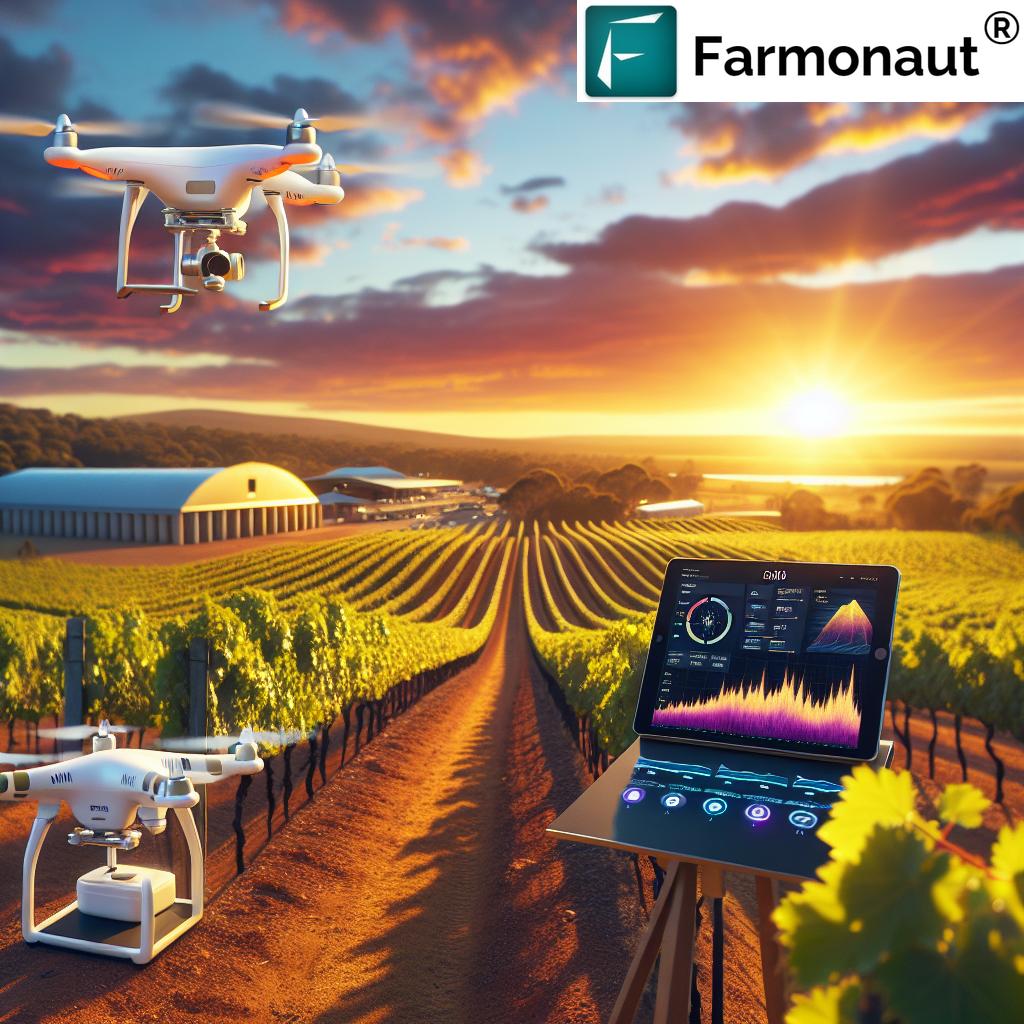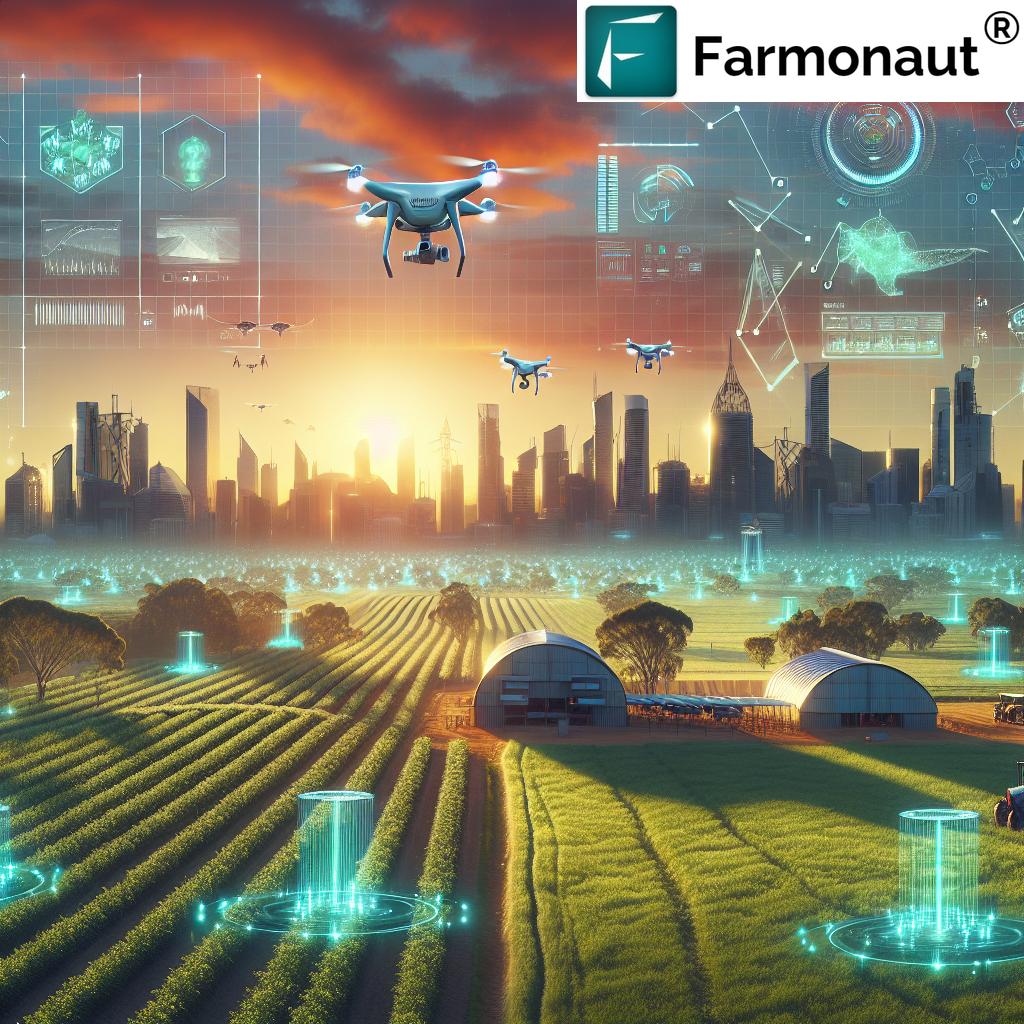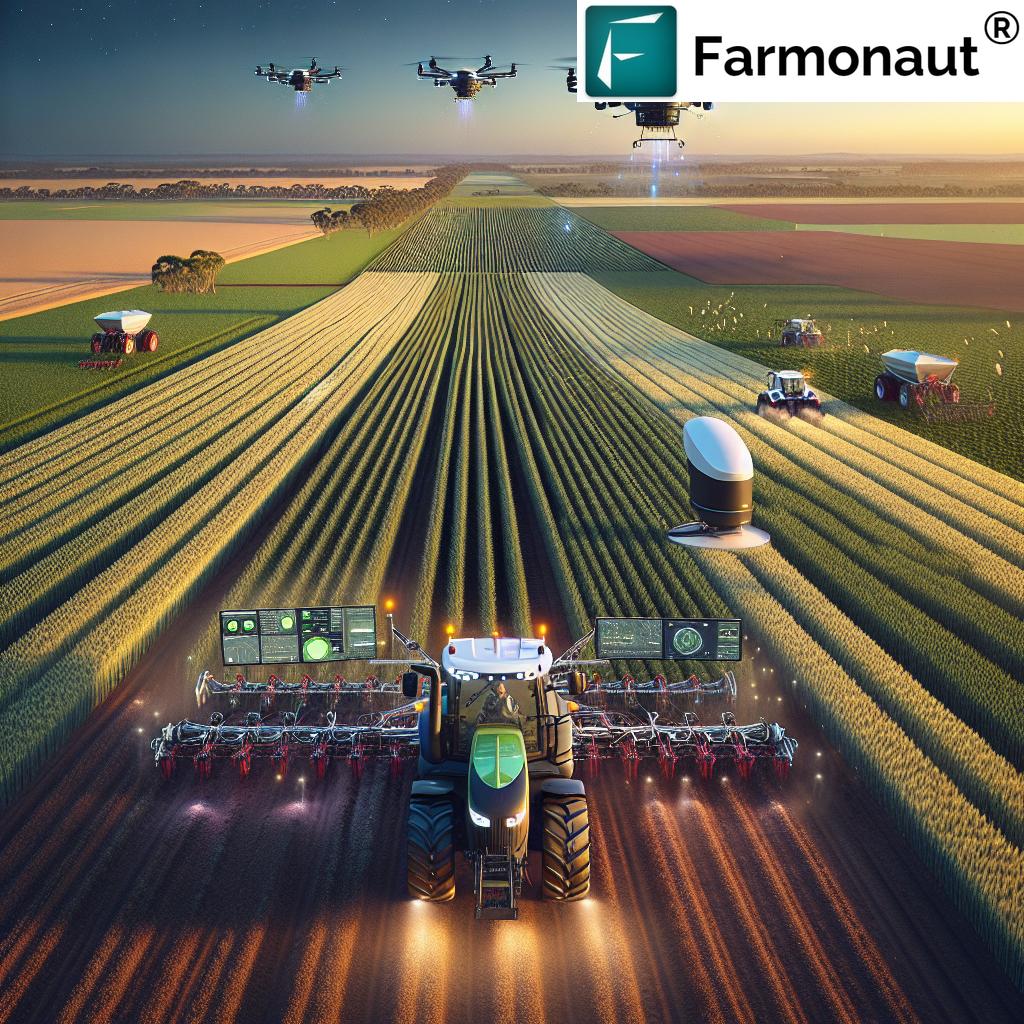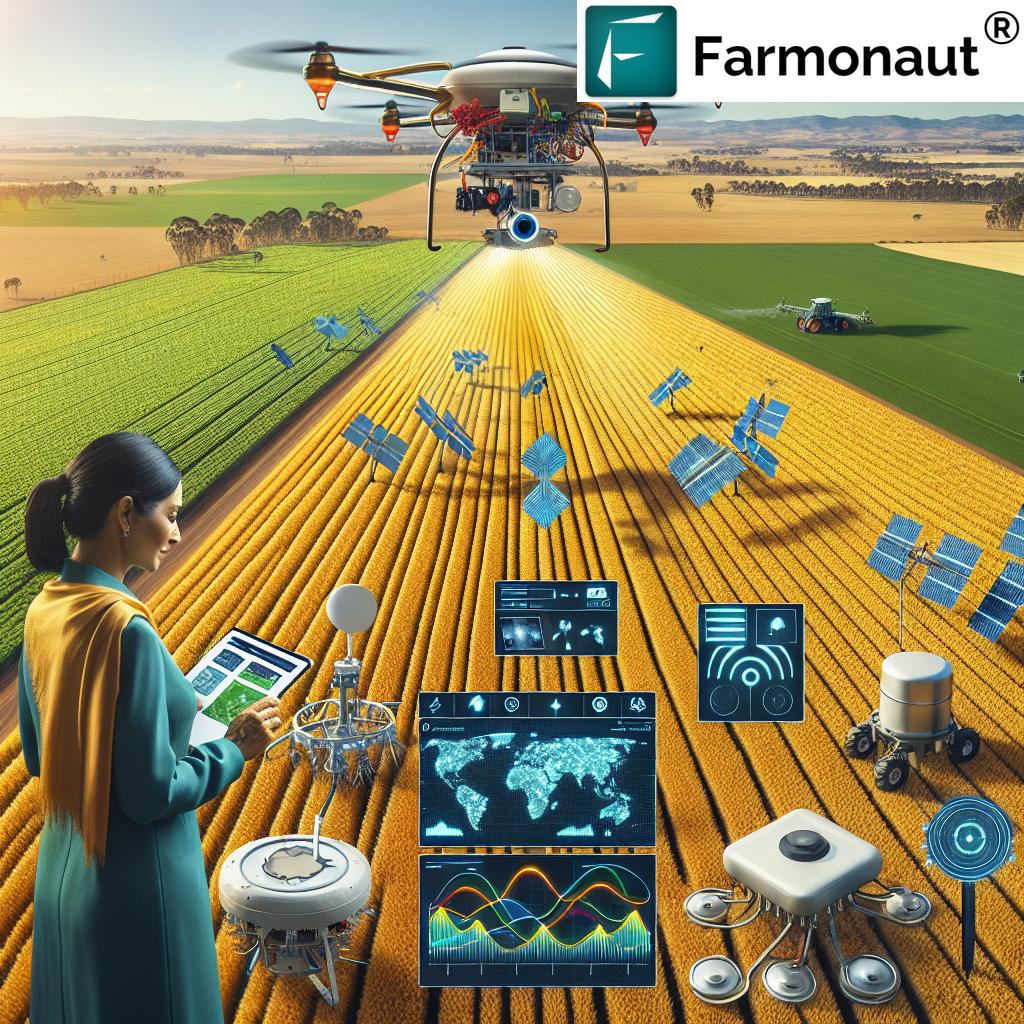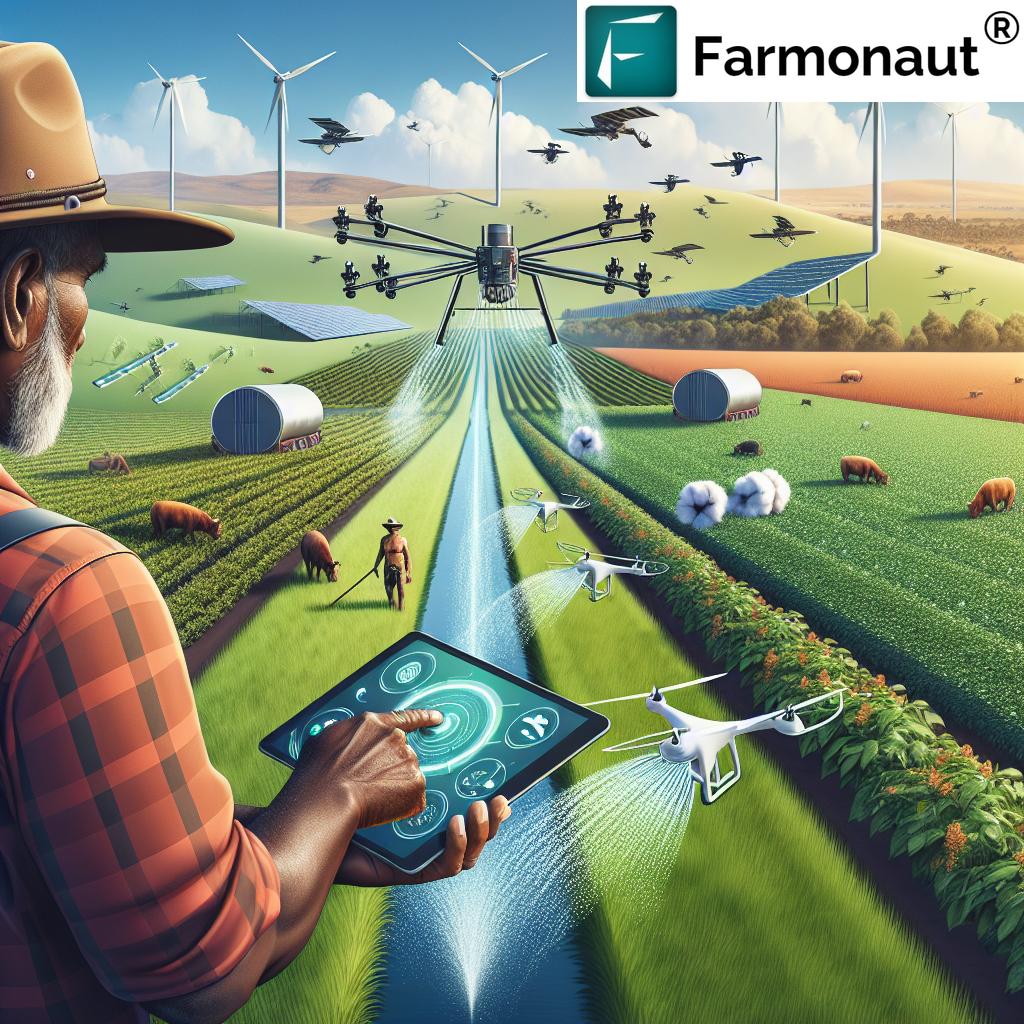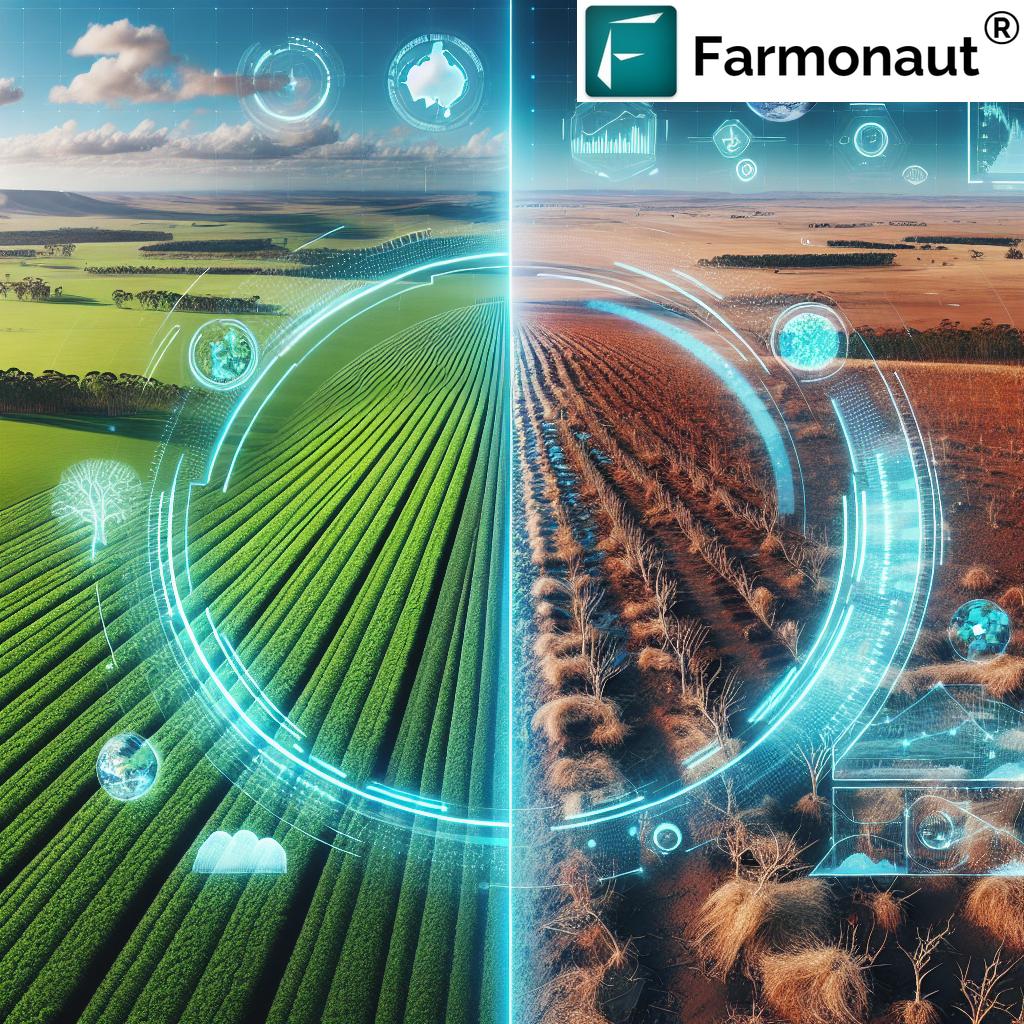Navigating Victoria’s Farm Protests: Essential Legal Guidelines for Safe and Effective Agricultural Activism
“Victoria’s agricultural sector employs over 190,000 people, making farm protests a significant economic concern.”
In the heart of Australia’s agricultural landscape, Victoria stands as a testament to the importance of farming and the complex issues surrounding it. As advocates for sustainable and ethical farming practices, we at Farmonaut understand the delicate balance between activism and legal compliance. This comprehensive guide aims to navigate the intricate world of farm protests in Victoria, providing essential legal guidelines for those passionate about agricultural reform.
Our expertise in agricultural technology and farm management software gives us a unique perspective on the challenges faced by both farmers and activists. As we delve into this topic, we’ll explore how modern smart farming techniques and precision agriculture can address some of the concerns that often lead to protests, while also providing a framework for safe and effective activism.
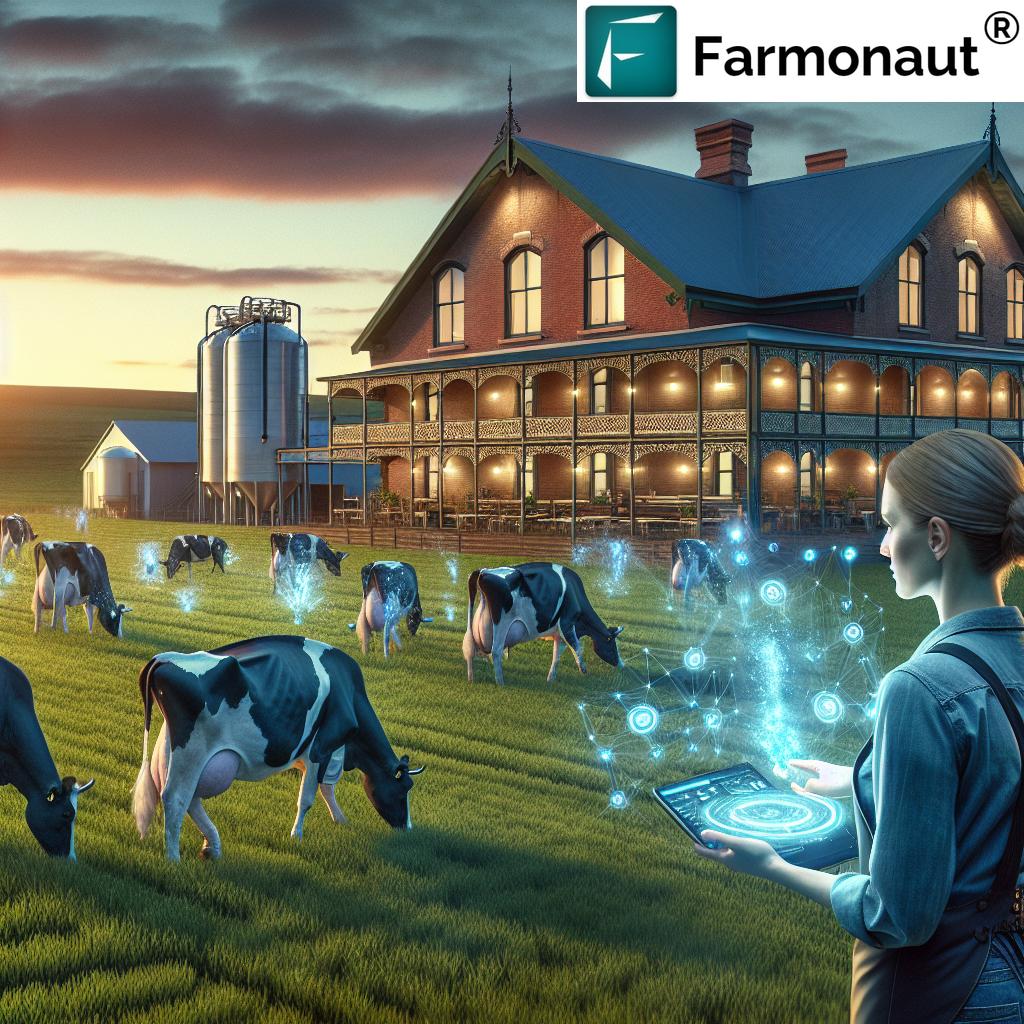
Understanding the Context of Farm Protests in Victoria
Before we dive into the legal guidelines, it’s crucial to understand the context of farm protests in Victoria. The agricultural sector in this Australian state is diverse, encompassing dairy farms, honey production, wildlife management, and various agricultural processing facilities. Protests often arise from concerns about animal welfare, environmental sustainability, and fair labor practices.
In recent years, we’ve seen an increase in activism targeting various aspects of farming, including:
- Demonstrations at dairy farms
- Protests at hatchery sale yards and knackeries
- Activism related to live export practices
- Campaigns focusing on the treatment of animals in holding yards
As providers of advanced crop monitoring systems and livestock tracking solutions, we recognize the importance of addressing these concerns through technology and innovation. However, we also acknowledge the right to peaceful protest and the need for clear legal guidelines to ensure the safety of all parties involved.
Legal Framework for Agricultural Activism in Victoria
When engaging in farm protests, it’s essential to be aware of the legal framework that governs such activities in Victoria. The right to protest is protected under Australian law, but this right is not absolute and must be balanced against other legal considerations.
Key legislation to be aware of includes:
- The Livestock Management Amendment (Animal Activism) Act 2021
- The Summary Offences Act 1966
- The Crimes Act 1958
- Biosecurity laws and regulations
These laws aim to protect the rights of farmers and agricultural businesses while also safeguarding animal welfare and environmental standards. As activists, it’s crucial to navigate this legal landscape carefully to ensure your message is heard without infringing on the rights of others or breaking the law.
Essential Legal Guidelines for Farm Protests
To help you navigate the complex legal landscape of farm protests in Victoria, we’ve compiled a set of essential guidelines. These are designed to help you engage in effective activism while minimizing legal risks:
- Obtain necessary permits: For any planned protest, especially those involving road blockades or large gatherings, obtain the necessary permits from local authorities.
- Respect private property: Entering private farm property without permission can lead to trespass charges. Always seek permission or protest from public areas.
- Maintain biosecurity protocols: If entering agricultural facilities, adhere strictly to biosecurity measures to prevent the spread of diseases among animals or plants.
- Avoid interference with business operations: Blocking access to farms or disrupting operations can lead to legal consequences. Focus on peaceful demonstration.
- Be cautious with recording: While photos and videos can be powerful tools for activism, be aware of privacy laws when recording individuals or private property.
Leveraging Technology for Effective and Safe Activism
At Farmonaut, we believe that technology can play a crucial role in addressing many of the concerns that lead to farm protests. Our agricultural data analytics and farm automation technology are designed to promote sustainable farming practices while improving efficiency and animal welfare.
Here are some ways technology can support safe and effective activism:
- Virtual tours: Use virtual reality technology to showcase farm conditions without physical trespassing.
- Drone applications: Employ agricultural drone applications for monitoring and documenting farm practices from a distance.
- Wearable devices: Advocate for the use of wearable technology on animals to monitor their health and well-being.
- Social media campaigns: Utilize digital platforms to raise awareness and gather support for your cause.
By embracing these technologies, activists can gather evidence and raise awareness without risking legal consequences associated with physical protests.
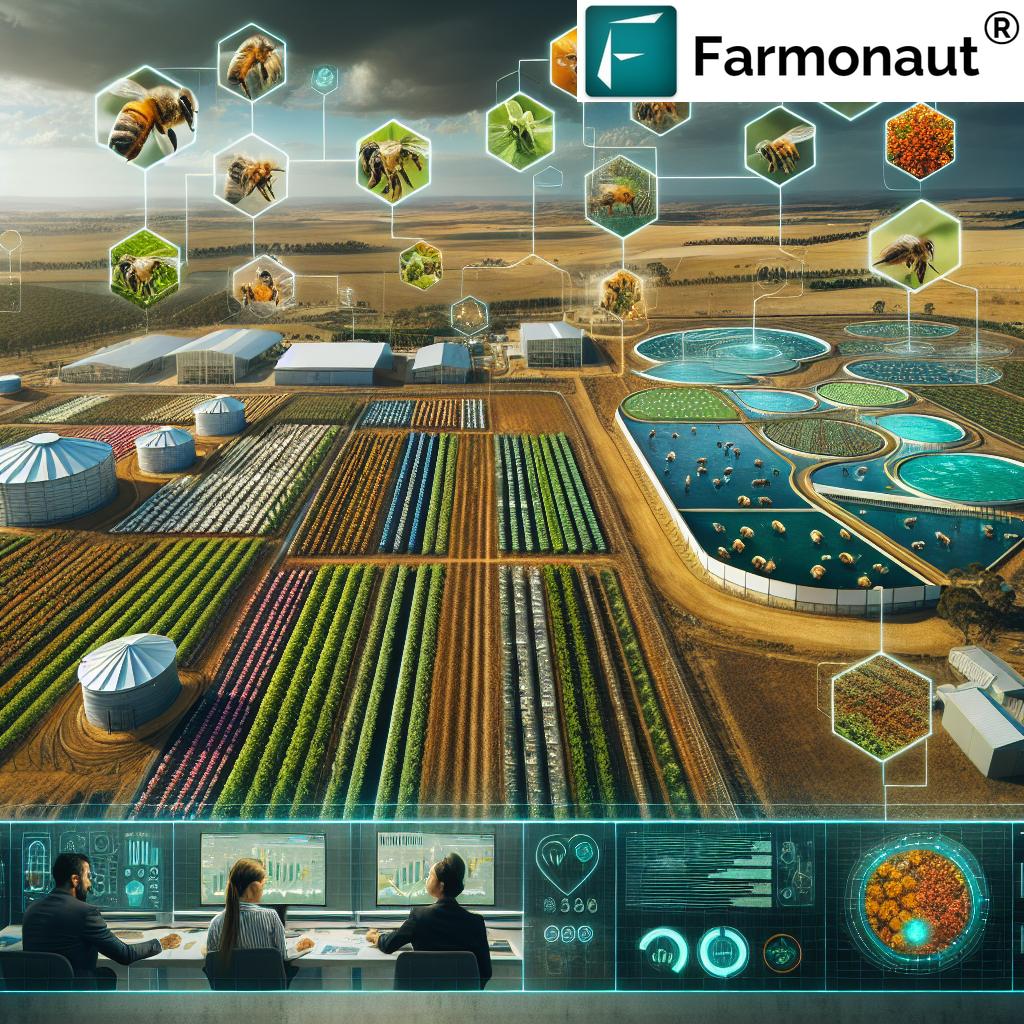
Specific Guidelines for Different Types of Activism
On-Farm Demonstrations
When conducting demonstrations at farms or agricultural processing facilities:
- Stay on public property unless you have explicit permission to enter private land.
- Maintain a safe distance from farm equipment and animals.
- Do not interfere with farm operations or attempt to release animals.
- Be prepared to provide identification if requested by law enforcement.
Road Blockades
If planning a road blockade as part of your protest:
- Obtain necessary permits from local authorities.
- Ensure emergency vehicles can pass through.
- Use clear signage to warn approaching vehicles.
- Have designated safety marshals to manage the crowd and traffic.
Undercover Investigations
For those considering undercover investigations:
- Be aware that trespassing and unauthorized recording can lead to serious legal consequences.
- Consult with legal experts before undertaking any undercover activities.
- Consider alternative methods, such as using publicly available data or satellite imagery, to gather information.
Interacting with Law Enforcement During Protests
Encounters with law enforcement are common during farm protests. Here are some guidelines for safe and respectful interactions:
- Remain calm and polite at all times.
- Clearly communicate your intention to protest peacefully.
- Comply with lawful orders from police officers.
- If arrested, exercise your right to remain silent and request legal representation.
- Document any interactions with law enforcement, but avoid interfering with their duties.
Remember, our goal is to promote positive change in the agricultural sector. By maintaining a respectful dialogue with law enforcement, we can ensure our message is heard without escalating tensions.
“Farmonaut’s precision agriculture solutions have increased crop yields by up to 25% in some Victorian farms.”
Using Social Media and Online Platforms Effectively
In today’s digital age, social media and online platforms play a crucial role in activism. Here are some tips for using these tools effectively and legally:
- Verify information before sharing to maintain credibility.
- Be aware of defamation laws when making claims about individuals or businesses.
- Use hashtags strategically to increase visibility of your cause.
- Engage respectfully with those who may disagree with your views.
- Utilize live streaming responsibly during protests, being mindful of privacy concerns.
By leveraging these platforms effectively, we can raise awareness about important agricultural issues and promote sustainable farming practices across Victoria and beyond.
Promoting Sustainable Agriculture Through Technology
At Farmonaut, we believe that many of the concerns driving farm protests can be addressed through the adoption of advanced agricultural technologies. Our farm management software and precision agriculture solutions are designed to promote sustainability, improve animal welfare, and increase transparency in farming practices.
Some of the ways our technology contributes to sustainable agriculture include:
- Optimizing resource use through precise crop monitoring systems
- Enhancing animal welfare with advanced livestock tracking solutions
- Reducing environmental impact through data-driven decision making
- Increasing transparency in supply chains with blockchain technology
By advocating for the adoption of these technologies, activists can work towards their goals while supporting the livelihoods of farmers and the broader agricultural community.
Legal Considerations for Specific Agricultural Sectors
Different agricultural sectors in Victoria may have specific legal considerations for activists to be aware of:
Dairy Sector
- Be aware of biosecurity protocols specific to dairy farms.
- Understand the regulations surrounding animal handling in dairy operations.
- Familiarize yourself with the dairy industry’s animal welfare standards.
Honey Production
- Respect the delicate nature of beekeeping operations.
- Be aware of regulations protecting native bee populations.
- Understand the importance of biosecurity in honey production.
Wildlife Management
- Know the laws surrounding the treatment of native species like kangaroos.
- Understand the regulations for managing introduced species such as rabbits and pigs.
- Be aware of conservation efforts and how they intersect with farming practices.
Aquaculture and Marine Farming
- Familiarize yourself with regulations governing marine and freshwater aquaculture.
- Understand the environmental impact assessments required for fish farms.
- Be aware of the specific challenges and regulations in marine farming environments.
By understanding these sector-specific considerations, activists can tailor their approach and ensure their actions are both effective and legally compliant.
Collaboration and Dialogue: A Path Forward
While protests play an important role in driving change, we at Farmonaut believe that collaboration and dialogue between activists, farmers, and technology providers can lead to more sustainable and positive outcomes. Here are some ways to promote constructive engagement:
- Organize forums and workshops to discuss agricultural issues and solutions
- Engage with local farming communities to understand their challenges and perspectives
- Collaborate with agricultural technology providers to develop and implement sustainable solutions
- Work with government agencies and policymakers to advocate for progressive agricultural policies
By fostering open communication and collaboration, we can work towards a more sustainable and ethical agricultural sector in Victoria and beyond.
Legal Guidelines for Agricultural Activism in Victoria
| Protest Activity | Legal Considerations | Recommended Actions | Potential Consequences |
|---|---|---|---|
| On-Farm Demonstrations | Trespass laws, biosecurity regulations | Stay on public property, maintain biosecurity protocols | Fines, criminal charges for trespass or biosecurity breaches |
| Road Blockades | Traffic laws, public order offenses | Obtain permits, ensure emergency vehicle access | Fines, charges for obstructing traffic |
| Animal Liberation Activities | Property laws, animal welfare regulations | Document and report concerns through legal channels | Theft charges, damage to property charges |
| Social Media Campaigns | Defamation laws, privacy regulations | Verify information, respect privacy, avoid defamatory statements | Civil lawsuits, account suspension |
Conclusion: Balancing Activism with Legal Compliance
Navigating the complex landscape of farm protests in Victoria requires a delicate balance between passionate advocacy and legal compliance. As we’ve explored in this guide, there are numerous legal considerations to keep in mind when engaging in agricultural activism. From understanding property rights to respecting biosecurity protocols, activists must be well-informed to ensure their actions are both effective and lawful.
At Farmonaut, we believe that technology and innovation play a crucial role in addressing many of the concerns that drive farm protests. Our agricultural technology solutions, including advanced crop monitoring systems and livestock tracking solutions, are designed to promote transparency, sustainability, and animal welfare in the farming sector.
As we move forward, we encourage activists to consider how technology can support their goals. By leveraging agricultural data analytics, farm automation technology, and other innovative tools, we can work towards a more sustainable and ethical agricultural future. Remember, the most effective activism is often the result of informed, collaborative efforts that respect both the law and the complex realities of modern farming.
We hope this guide serves as a valuable resource for those passionate about agricultural reform in Victoria. By staying informed, respecting legal boundaries, and embracing innovative solutions, we can all contribute to positive change in the agricultural sector.
FAQ Section
Q: What are the main legal risks associated with farm protests in Victoria?
A: The main legal risks include trespassing charges, violations of biosecurity laws, public order offenses, and potential civil liabilities for property damage or business interruption.
Q: Can I take photos or videos during a farm protest?
A: Yes, you can take photos or videos in public spaces. However, be cautious about recording on private property without permission, as this could lead to legal issues.
Q: How can technology support agricultural activism?
A: Technology can support activism through virtual tours, drone monitoring, social media campaigns, and by promoting transparent and sustainable farming practices through advanced agricultural management systems.
Q: What should I do if I’m arrested during a farm protest?
A: If arrested, remain calm, exercise your right to remain silent, and request legal representation. Do not resist arrest, and comply with lawful orders from law enforcement.
Q: Are there alternatives to physical protests that can be effective?
A: Yes, alternatives include online campaigns, engaging with policymakers, collaborating with farmers on sustainable practices, and promoting the adoption of agricultural technologies that address concerns about animal welfare and environmental impact.
For more information on how Farmonaut’s agricultural technology solutions can contribute to sustainable farming practices, visit our web app or explore our API for developers. You can also check out our API Developer Docs for detailed information on integrating our technology into your own systems.
Download our mobile apps for on-the-go access to advanced agricultural insights:
By leveraging these tools and staying informed about legal guidelines, we can work together towards a more sustainable and ethical agricultural future in Victoria and beyond.




